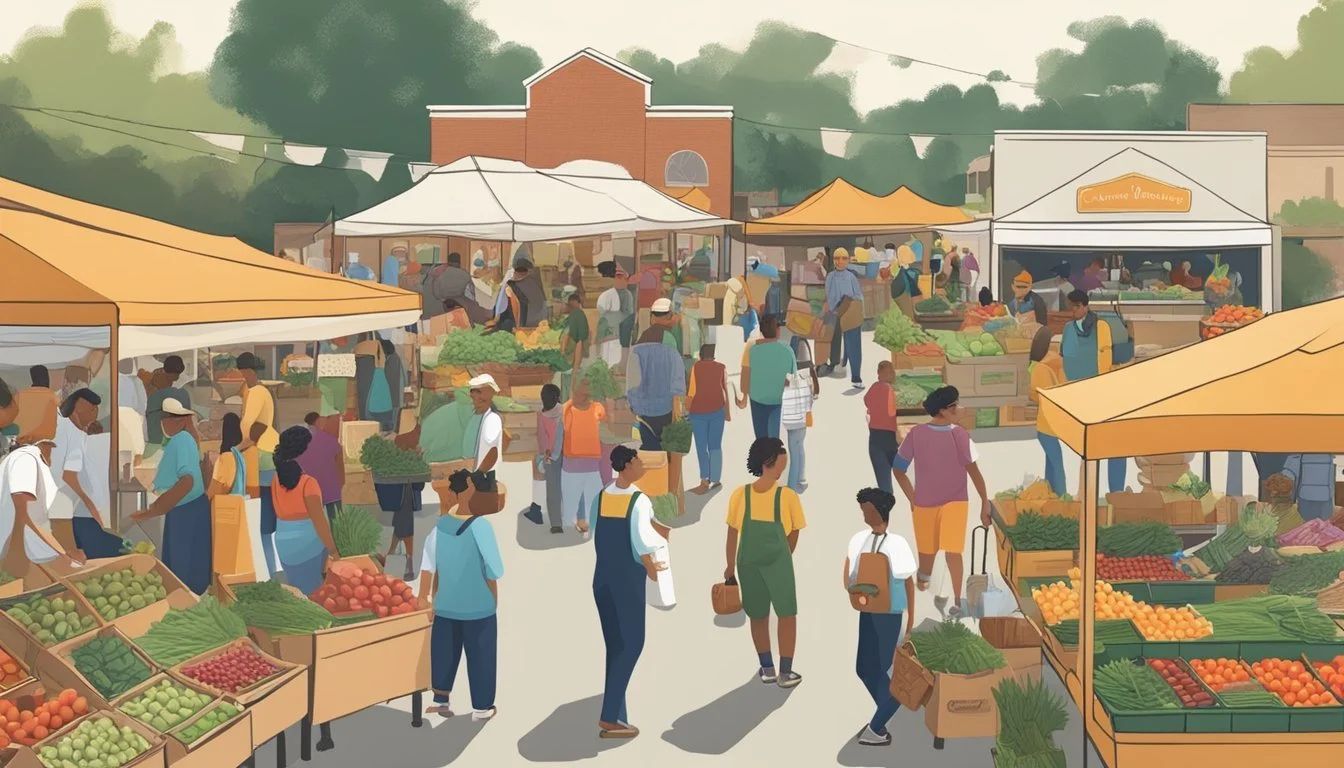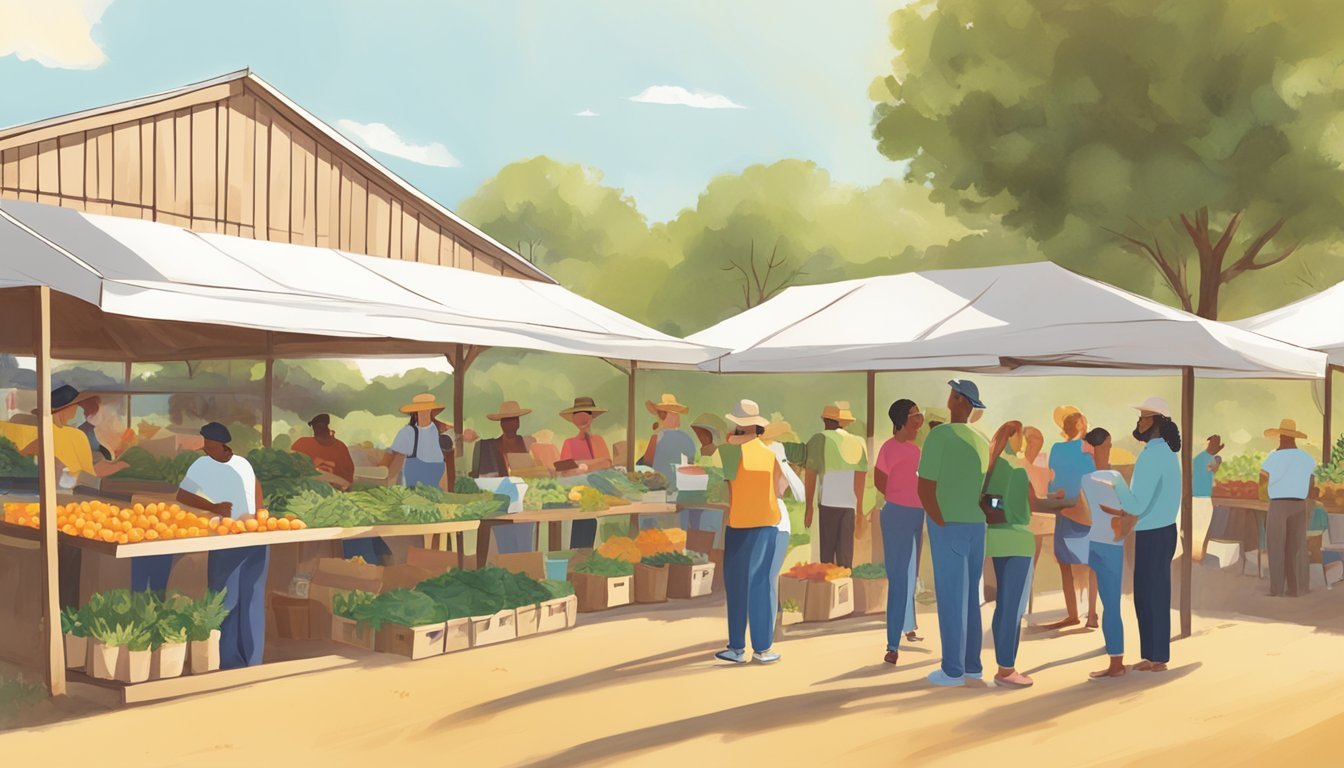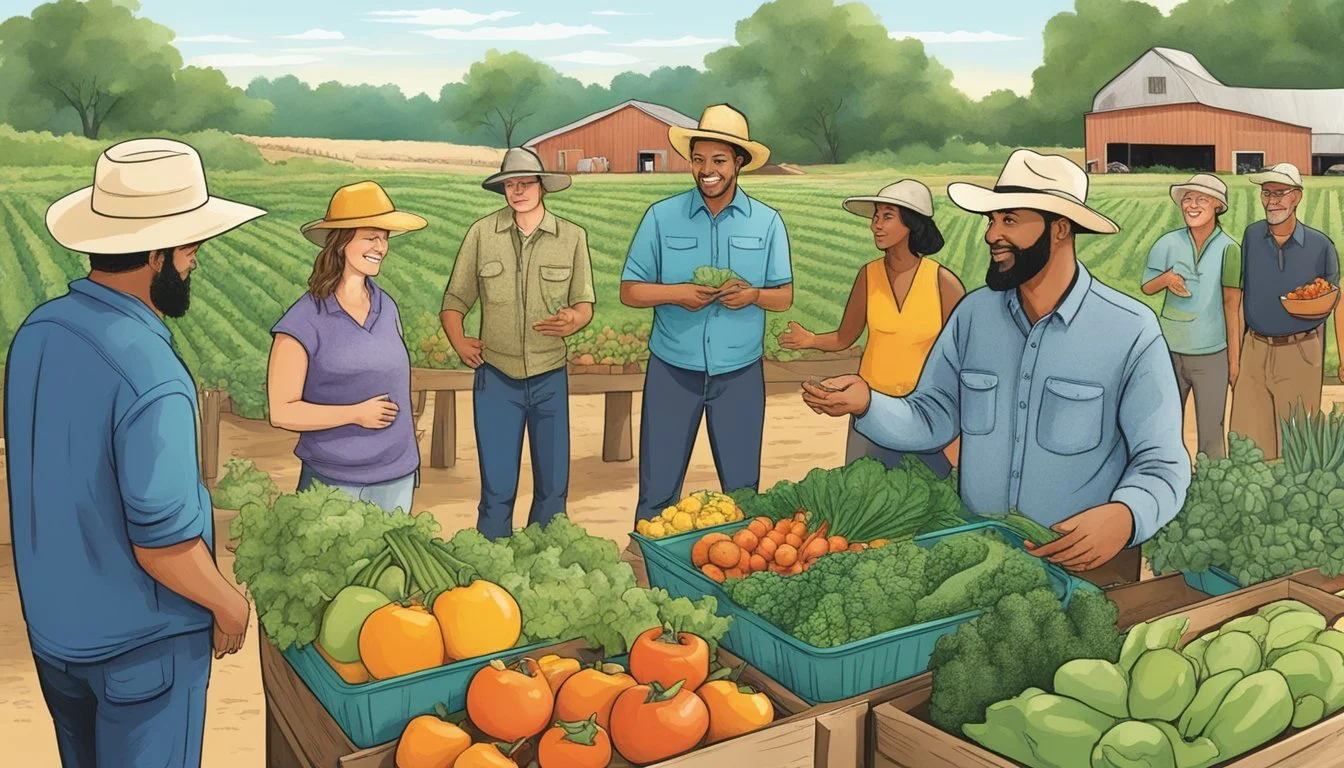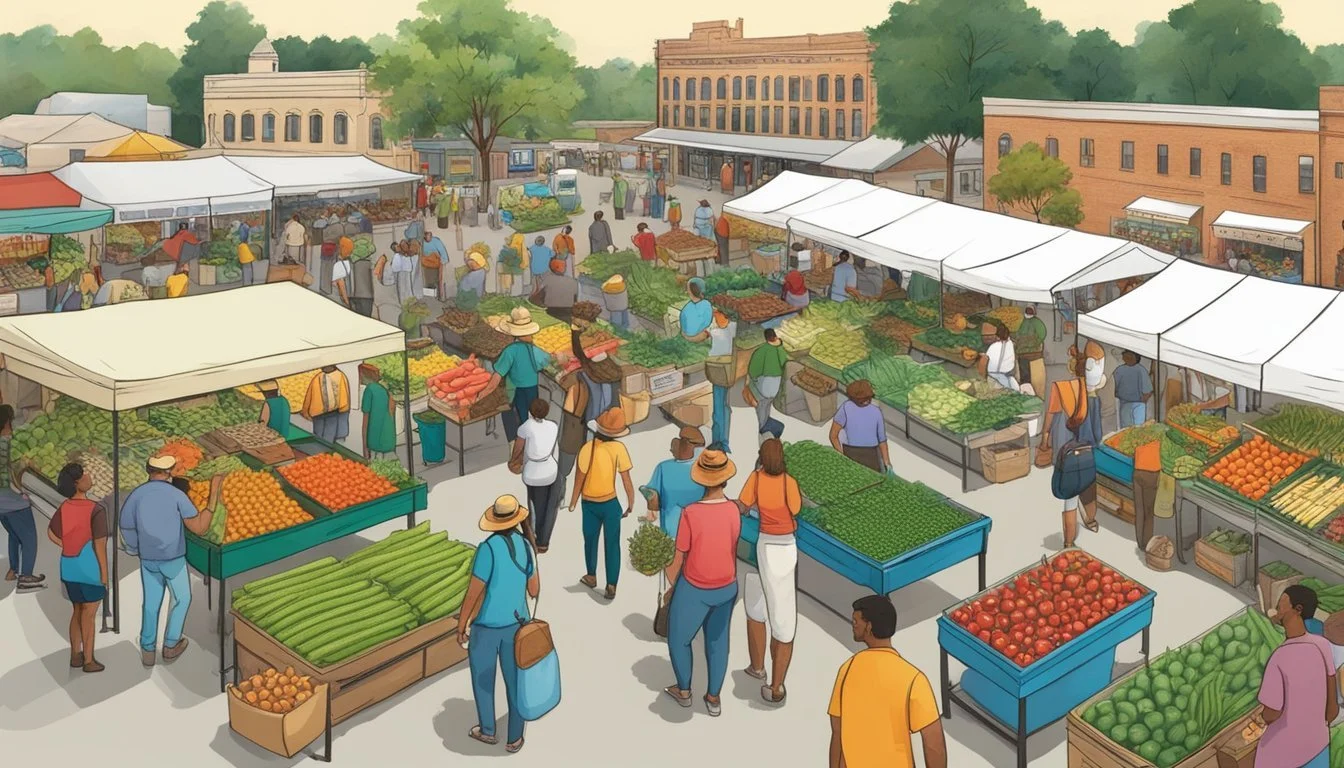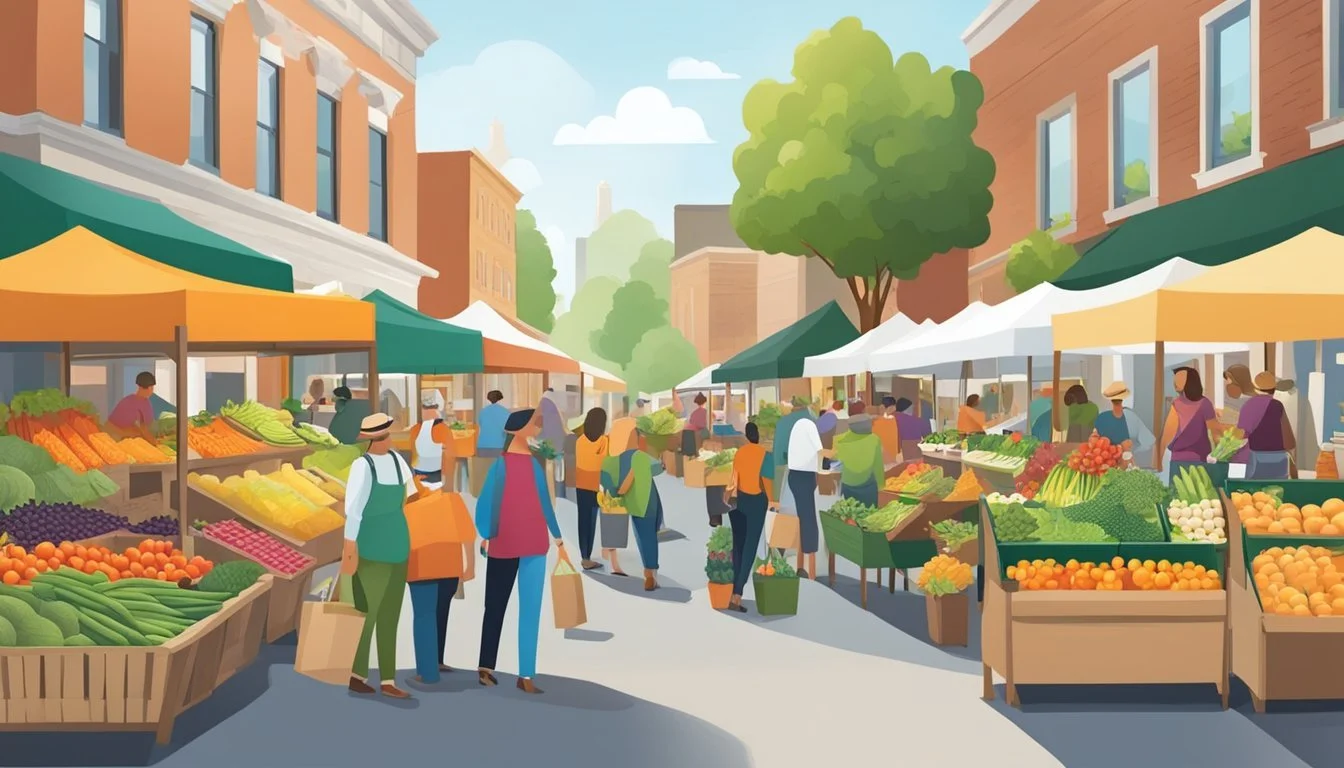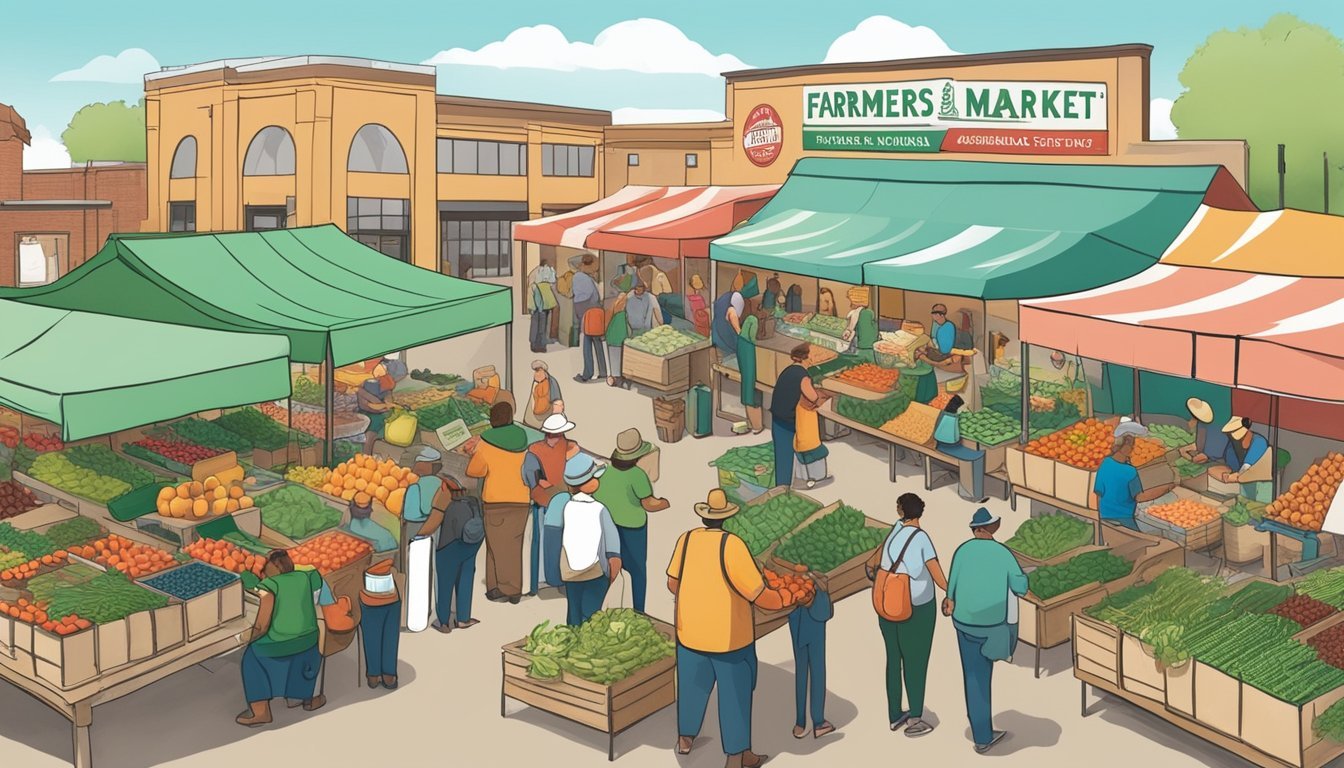Community Supported Agriculture (CSA) in Waco, TX
A Guide to Local Farm Shares
Community Supported Agriculture, commonly known as CSA, is a model of food distribution that directly connects consumers with local farms. In Waco, Texas, CSA programs allow individuals to purchase subscriptions, or "shares," of a farm's harvest in advance. These subscriptions often include a variety of seasonal produce, and in some cases, additional farm products like pastured eggs, free-range chicken, and grass-fed beef. Consumers receive regular deliveries of fresh, usually organic, produce, providing a predictable income stream for farmers and ensuring a market for their crops.
The evolution of CSA in Waco reflects a growing interest in sustainable agricultural practices and a desire to foster a closer relationship between farmers and the community. Local farms around Waco offer shares that bring fresh, nutritionally rich foods to households while promoting environmentally friendly farming methods. Participating in a CSA not only supports the local economy but also encourages dietary variation with an array of produce that changes throughout the growing season.
CSAs in Waco, TX, have become a way for residents to engage in the local food movement, prioritizing farm-to-table eating. Families and individuals have various options from nearby farms—some located within a 25-mile radius of Waco—that adapt the CSA model to suit the needs of the community. This includes options for pick-up and delivery, customizable share sizes, and even flexible participation, accommodating those living slightly outside the standard service area.
Overview of Community Supported Agriculture (CSA)
Community Supported Agriculture in Waco, TX, represents a collaborative approach to food production and consumption, connecting farmers directly with consumers, who share both the benefits and risks of agricultural output.
History and Concept of CSA
Community Supported Agriculture (CSA) is a model that originated in the 1960s in Europe and Japan as a response to concerns about food safety and the urban-rural disconnect. The concept arrived in the United States in the 1980s. It is built on a partnership between farmers and their local communities, where consumers provide upfront support to farms, securing a share of the season's harvest.
Benefits of CSAs for Consumers and Farmers
For Consumers:
Guaranteed share of fresh, locally grown produce, often at lower prices than retail.
Increased connection to the land and knowledge about food production.
For Farmers:
Stable and secure early-season capital to fund operations.
Stronger bonds with community, leading to enhanced support and understanding.
CSA Structure and Membership
In Waco, TX, a CSA typically functions through memberships or subscriptions where consumers commit to a season of produce, and in return, farmers pledge to supply a regular assortment of fresh goods. Membership details, such as pickup/delivery options, share sizes, and payment plans, are generally outlined at the start of the season. This structure fosters a community where everybody plays a role in sustaining local agriculture.
Local Impact of CSAs in Waco, TX
In Waco, TX, Community Supported Agriculture has made a tangible difference in supporting the local economy, reinforcing the bond between consumers and Central Texas farmers, and fostering active community involvement.
Economic Contributions
Waco has seen a boost in its local economy through the operation of CSAs. By enabling direct sales at venues like farmers markets, money circulates within the region, benefiting local businesses and labor markets. It's estimated that each dollar spent at a local business, like those participating in CSAs, generates roughly twice as much income for the local economy compared to spending at national chains.
Support for Local Farmers
CSAs in Waco significantly aid local farmers by providing them with a consistent and reliable customer base. This partnership reduces the financial uncertainties often associated with agriculture, given the confirmed sales ahead of the season. As a result, Central Texas farmers can focus on sustainable farming practices and maintaining the quality of their produce.
Community Engagement
The CSAs in Waco have successfully cultivated a sense of community engagement, connecting consumers directly with the source of their food. Central Texas residents value the transparency and the relationship that CSAs offer, often resulting in frequent interactions at local farmers markets and social media platforms. These interactions not only build a bond over food but also contribute to the overall social fabric of the region.
Farm and Produce Details
The CSA model in Waco, TX connects consumers directly to local farms, offering a diverse array of farm-fresh and seasonal produce, including organic options. Participants receive regular shares of produce, contributing to the sustainability of local agriculture.
Seasonal Produce Offered
Community Supported Agriculture in Waco provides a variety of seasonal produce throughout the year. In the warmer months, members can expect fresh vegetables and fruits such as tomatoes, peppers, and melons. The cooler seasons often bring leafy greens, root vegetables, and winter squashes. Some CSAs may also include flowers and herbs, enhancing the variety of their offerings.
Types of Farms Participating
Participating farms range from small, family-owned operations to larger agricultural ventures. For instance, Feathered Fork Farms, situated roughly 30 miles Southeast of Waco, exemplifies a local homestead contributing to the CSA scene with fresh produce and meat products. The Home Grown Farm, another family farm outside of Waco, provides CSA services to the local community. Such farms are integral for fostering a direct connection between consumers and the source of their food.
Organic and Sustainable Practices
CSAs in Waco are committed to promoting organic and sustainable practices in agriculture. Some farms use bio-intensive methods to cultivate their crops, ensuring the practice of sustainable agriculture. These methods not only support the health of the soil but also aim to provide a pesticide-free product to their consumers. Moreover, farms like Davis Family Olive Farm focus on offering pastured eggs, free-range chickens, and grass-fed beef, adhering to the principles of humane and sustainable farming. The cultivation of organic produce by these participating farms showcases their dedication to environmentally responsible farming techniques.
Membership and Subscription Process
When individuals or families in Waco, TX, consider joining a Community Supported Agriculture (CSA) program, they embark on a journey where they directly support local agriculture, potentially save money, and commit to receiving a regular supply of fresh, locally-grown produce.
How to Become a Member
To become a CSA member in Waco, consumers typically begin by selecting a local farm that offers CSA shares. Then, they sign up, usually through the farm's website, completing a membership form that includes their contact details and preferred pick-up location. After submitting the form, they receive confirmation and details about the start of their subscription.
Understanding CSA Subscriptions
A CSA subscription involves purchasing a "share" of the farm's output for a season. Subscribers receive a box of vegetables or other farm products at regular intervals, often weekly or bi-weekly. The contents of the box vary based on what the farm harvests each week, offering members a diverse range of produce throughout the season.
Costs and Savings
Cost: CSA memberships can vary in price depending on the farm, share size, and length of subscription. Some CSAs offer different tiers for individuals and families to suit various needs and budgets.
Savings: By joining a CSA, members often benefit from cost savings compared to retail purchasing. The upfront payment for the season helps farms plan their expenses and allows consumers to lock in prices for fresh produce throughout the season.
Share Type Price Range Savings Potential Individual Share $200 - $350 5-10% off retail Family Share $400 - $600 10-15% off retail
Risks and Considerations
When individuals in Waco, TX, invest in Community Supported Agriculture (CSA), they should consider certain risks that can affect the nature and output of their subscriptions. These risks include unpredictable weather patterns and the resultant impact on crop and product availability.
Weather-Related Risks
Community Supported Agriculture is influenced heavily by local weather conditions. Members must understand that they share in the weather risks alongside the farmer. If severe weather strikes, such as drought or flooding, it can lead to reductions in crop yields or even total losses. Vegetable and meat production can suffer, which directly impacts CSA share volumes and variety.
Drought: Hinders plant growth, reduces yields, and may necessitate water rationing.
Excessive Rainfall: Causes flooding, crop diseases, and can delay planting or harvesting.
Crop Variety and Availability
The nature of CSA is predicated on seasonal crops and harvesting schedules, which means that shareholders might receive a different array of vegetables and other food products each week. Farmers plan their production schedule, but there is no guarantee for exact crop availability. Factors such as seed availability, germination rates, and pest pressures can alter expected outcomes. CSA members should be prepared for:
Varied Crop Availability: Some weeks may bring an abundance of some vegetables, while others may offer a limited selection.
Changes in Production Plans: Unforeseen issues may require farmers to adjust which crops are planted and harvested.
Members should bear in mind that part of the CSA model includes sharing in the risk of farming and understanding that agriculture is inherently unpredictable.
Additional Offerings and Community Benefits
In Waco, TX, Community Supported Agriculture (CSA) goes beyond the distribution of fresh produce by engaging community members through various programs. These initiatives often focus on volunteerism, environmental stewardship, and charitable outreach, providing meaningful connections between farmers and residents.
Volunteer and Stewardship Programs
World Hunger Relief, Inc., a Christian organization near Waco, invites community members to participate in volunteer programs aimed at improving local food systems and combating hunger. Its Volunteer Farmer Program allows individuals to work directly with sustainable farming practices, reinforcing a spirit of environmental stewardship.
Table: Selected Volunteer Opportunities
Program Description Farm Work Days Engage in various farm tasks, learn organic practices. Educational Workshops Attend sessions on sustainable agriculture, nutrition. Community Outreach Help in efforts to provide food to those in need.
Ministries and Charitable Involvement
CSAs in the Waco region often collaborate with ministries to promote food justice and support local charitable efforts. Through partnerships with churches and Christian organizations, they strive to address issues like food insecurity, integrating faith with farming.
List: Ministry-Associated Activities
Harvest Sharing: CSAs donate a portion of their yield to local food banks and ministries.
Fundraising Events: Joint events with churches to raise resources for community programs.
Education: Partnering with faith-based groups to educate the community on healthy eating.
By supporting these endeavors, CSA members play an active role in fostering community growth and helping those in need.
Extended Market Reach
Community Supported Agriculture (CSA) in Waco, Texas, has extended its market reach through robust online platforms and strategic partnerships. These efforts connect consumers with a variety of farm offerings, from pastured poultry to Black Angus beef, enhancing the availability and distribution of local products.
LocalHarvest and Online Presence
LocalHarvest is a key player in expanding the market for CSAs in Waco. By listing on LocalHarvest, farms increase their visibility and provide consumers with a convenient online directory to access fresh, locally-sourced produce and meats, including chicken, dairy products, and different cuts of beef. Texas Farm Box, as an example, represents an innovative online model that allows residents to enjoy fresh, Texas-grown foods delivered right to their door.
Farm Listing: Farms can list their products on LocalHarvest, reaching a wider customer base.
CSA Management Software: Tools such as CSAware support these farms in efficiently managing subscriptions and orders.
Partnerships Beyond Waco
Farms in Waco have expanded their reach through partnerships with businesses and markets beyond their local area. Participation in farmers markets not only in Waco but in nearby cities allows for a broader distribution of their goods, such as artisanal cheese and organic dairy. Strategic partnerships often include:
Local Restaurants: Collaborations to supply farm-to-table ingredients.
Adjacent City Markets: Expansion into markets outside of Waco for a broader customer base.
By employing strategies such as online presences and forging regional partnerships, CSAs in Waco are able to support sustainable agriculture practices while satisfying the growing consumer demand for high-quality, locally-produced food items.
Consumer Experience and Education
Participants in CSA programs in Waco, TX benefit from deeper connections with their food sources and educational opportunities that enrich their understanding of sustainable agriculture. Families and individual members gain hands-on experience through events and develop meaningful relationships with their local farmers.
CSA Events and Cooking Classes
CSA programs often host events and cooking classes that provide members with the opportunity to learn new culinary skills and understand the nutritional value of what they consume. Members can partake in classes that teach them how to prepare seasonal produce, which maximizes consumer satisfaction and helps in making the most of their CSA shares.
Cooking Demonstrations: Chefs or skilled community members show how to turn fresh, seasonal produce into delicious meals.
Seasonal Workshops: Focus on preserving the harvest, such as canning or fermenting, so members can enjoy their produce year-round.
Building Relationships with Farmers
The foundation of the CSA model is the direct relationship between consumers and farmers. Consumers who join CSA programs become stake-holders in the farm's production and share in the risks and bounties of agricultural life.
Farm Visits: Members are often invited to visit the farm, allowing them to see where and how their food is grown.
Meet-the-Farmer Events: These events facilitate discussions about farming practices, concerns, and the benefits of local food systems.
By engaging in CSA events and forming personal connections with farmers, members support the local economy while receiving education on sustainable practices. This approach ensures they are not only consumers but also informed participants in their local food system.
Economic and Business Factors
Community Supported Agriculture (CSA) programs have a direct influence on the financial sustainability and business operations of farms. They impact farm income and necessitate strategic marketing approaches to maintain and grow their customer base.
Impact of CSA on Farm Income
CSA programs operate on a subscription-based model where consumers pay at the onset of the growing season for a share of the anticipated harvest. This upfront payment is fundamental in providing farmers with a reliable income early in the season, which is crucial for managing cash flow and planning for the year ahead. The regular income from CSA memberships helps farmers in the Waco, TX area cover the initial costs of seeds, fertilizers, and labor before the harvest begins.
A key advantage of CSA is the ability to reduce marketing and sales expenses. Since produce is presold, there is less need for extensive advertising or market fees, allowing farmers to focus resources on farming practices that might include transitioning to organic fertilizers or adopting more sustainable farming methods.
Marketing Strategies for CSA
Effective marketing strategies are essential to the success of a CSA, as they need to ensure a sufficient number of shares are sold to make the farm financially viable. Farmers must communicate the value of their CSA shares, which often involves educating potential customers about the benefits of supporting local agriculture and the advantages of receiving fresh, seasonally available produce.
Key marketing strategies include:
Utilization of social media platforms to showcase farm operations, available products, and share testimonials from satisfied CSA members.
Attending local farmers' markets and community events to increase visibility and directly engage with potential CSA members.
Collaboration with local businesses and organizations to offer CSA pick-up points, making it more convenient for members and exposing the CSA to a wider audience.
By employing these strategies, farms can increase their sales and build a loyal customer base that appreciates the impact of their investment on local farming sustainability.
Conclusion
Community Supported Agriculture (CSA) has firmly taken root in Waco, TX. Local farms, such as the Davis Family Olive Farm, demonstrate the viable application of the CSA model through their vibrant operation. CSA's approach in Waco reflects a growing preference for sustainable, local, and seasonal food supplies.
This model fosters a connection between consumers and producers, with mutual benefits. Consumers enjoy fresh, high-quality produce, while farmers gain a dependable revenue stream. It is not just a consumer-producer bond but a community collaboration that enhances food security and sustains local agriculture.
In these CSA partnerships, residents of Waco have shown their commitment by pre-paying for seasonal harvests, which in turn supports the farm's operational costs upfront. The success of CSA in the area underlines a deliberate movement towards ecological and communal resilience.
The CSA model in Waco empowers consumers to take an active role in the agricultural process. It's clear that such systems will likely continue to grow, enriching the community's palate and economy alike. The promise of CSA in Waco is evident: stronger farm-to-kitchen links, economic stability for farmers, and a healthier, more connected society.

